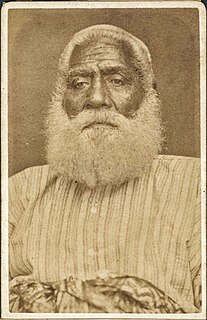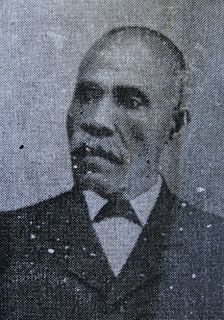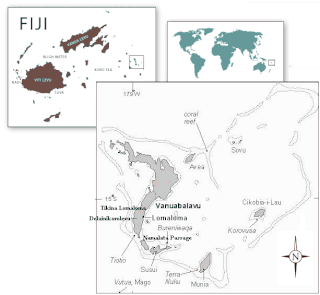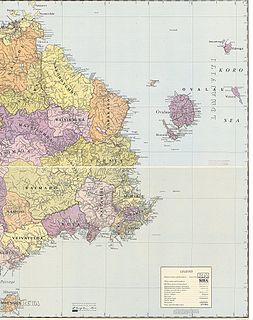This page is based on this
Wikipedia article Text is available under the
CC BY-SA 4.0 license; additional terms may apply.
Images, videos and audio are available under their respective licenses.

Ratu Seru Epenisa Cakobau was a Fijian Ratu and warlord (Vunivalu) who united part of Fiji's warring tribes under his leadership, establishing a united Fijian kingdom.
Ratu (raatuu) is an Austronesian title used by Fijians of chiefly rank. An equivalent title, Adi, is used by females of chiefly rank. In the Malay language, the title Ratu is also the traditional honorific title to refer to the ruling king or queen in Javanese culture. Thus in Java, a royal palace is called "keraton", constructed from the circumfix ke- -an and Ratu, to describe the residence of the Ratu.

Ratu Joni Madraiwiwi was a Fijian Ratu and early colonial administrator in what was then the British Crown Colony of Fiji.
Kubuna is one of three confederacies which comprise Fiji's House of Chiefs, to which all of Fiji's chiefs belong.
Adi Litia Samanunu Cakobau-Talakuli (1940–2012) was a Fijian chief, politician, and diplomat. The eldest child of Ratu Sir George Cakobau, Talakuli held a number of senior positions in the Fijian government. She was Minister for iTaukei Affairs in 1994 and 1995, and was considered as a candidate for the Vice-Presidency in 1997. She became Fiji's High Commissioner to Malaysia and Ambassador to Thailand and the Economic and Social Commission for Asia and the Pacific in 1999
Bau is a small island in Fiji, off the east coast of the main island of Viti Levu. Bau rose to prominence in the mid-1800s and became Fiji's dominant power; until its cession to Britain, it has maintained its influence in politics and leadership right through to modern Fiji.
Adi Finau Tamari Tabakaucoro is a former Fijian politician, who served as Assistant Minister for Women, Culture, and Social Welfare in the interim Cabinet formed by Laisenia Qarase in the wake of the Fiji coup of 2000. She held office till an elected government took power in September 2001. She stood as an independent candidate in the Tailevu South Lomaiviti Open Constituency in the 2001 election, but was not successful.

The monarchy of Fiji arose in the mid-nineteenth century when native ruler Seru Epenisa Cakobau consolidated control of the Fijian Islands and declared himself King or paramount chief of Fiji. In 1874, he voluntarily ceded sovereignty of the islands to Britain, which made Fiji a Crown colony within the British Empire. After nearly a century of British rule, Fiji became a Dominion, an independent sovereign state within the Commonwealth of Nations with Elizabeth II as head of state. After a second military coup in 1987, Fiji became a republic, and the monarchy was ended. Nevertheless, the Great Council of Chiefs recognised Elizabeth II as Tui Viti or the traditional Queen of Fiji, but the position is not one of a constitutional, or otherwise legal nature. The Great Council of Chiefs was disestablished in 2012 by decree. Elizabeth II does not use the title, and the Fijian government does not recognise it.
Nakorotubu is a district in Fiji's Ra Province. It is made up seven sub-districts or Tikina makawa, namely,
Kavula, Nakorotubu, Navitilevu, Bure-i-wai, Bure-i-vanua, Mataso, and Nakuailava.

Turaga na Rasau is a traditional Fijian chiefly title of the Lau Islands.
Prior to Fiji's colonial days, Fiji had many different Vanua with their own Paramount Chieftain which exercised no authority over the other; a saying from the island of Kadavu aptly summarises it "Nomu Turaga o sega na noqu Turaga" or "Your Chief is not my Chief" also the people of Beqa Island were of a similar opinion saying "Qali Cuva Ki Lagi" or "Subject only to heaven" and would bow to no outside Chieftain, but at the turn of the 20th century aspects of the traditional social structure remained, but for administrative purposes three main Matanitu were solidified and formed as they were the dominant consolidated powers at the time being that of Burebasaga, Kubuna and Tovata.
With regard to the Rasau while its traditional origins were in Kubuna on Bau the titles traditional authority in modern Fiji is now in Tovata, Lau in particular Lomaloma Tikina on the Island of Vanua Balavu.
Joseph Waterhouse was an English-born Australian Methodist minister and missionary in Fiji. He is credited with having converted, to Christianity, Cakobau, chief of Bau and King of Fiji.
Fiji has three official languages under the 1997 constitution : English, Fijian and Hindi. Fijian is spoken either as a first or second language by most indigenous Fijians who make up around 54% of the population.
Bau is the main village on Bau Island, Fiji. Once integral to the power and economy of the chiefly village, the villages of Lasakau and Soso are also located on the twenty-two acre island which became the centre of traditional power throughout the Fiji Islands in the nineteenth century.

Verata is a Tikina in Fiji's Tailevu Province. It is made up of several sub-districts or Tikina makawa, namely:
Verata, Namalata, Tai, Vugalei, and Taivugalei.
Ratu Jione Atonio Rabici Doviverata OBE was a Bau chief and medical doctor and administrator in colonial Fiji.
Turaga na Roko Tui Bau is a vassal chief to the Vunivalu of Bau, Paramount Chief of the Kubuna Confederacy.







